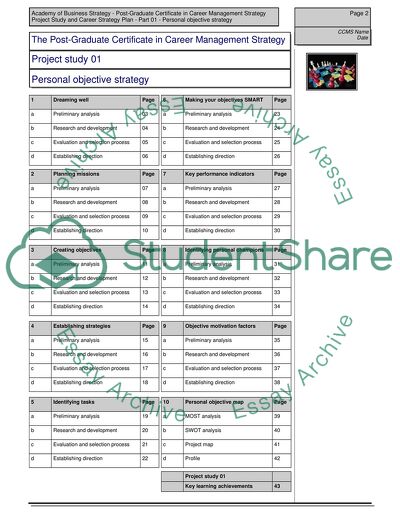
- Home
- Free Samples
- Premium Essays
- Editing Services
- Extra Tools
- Essay Writing Help
- About Us
- Studentshare
- Subjects
- Education
- Post-Graduate Certificate in Career Management Strategy
Post-Graduate Certificate in Career Management Strategy - Personal Statement Example

- Subject: Education
- Type: Personal Statement
- Level: Undergraduate
- Pages: 47 (11750 words)
- Downloads: 0
- Author: schulistmacy
Extract of sample "Post-Graduate Certificate in Career Management Strategy"
Simerson (89) argues that it is necessary to gather and analyze everything about your dream, from personal stock-taking to externally available opportunities. My career planning strengths include being a team worker, having good communication skills, a warm and approachable personality, and research and analysis techniques. Weaknesses have little international corporate knowledge and a lack of accounting skills. The opportunities include the increasing emphasis being placed on sustainability and environmental awareness. Failure to complete the CCMS and attachment threatens my career planning. My unique selling proposition is my knowledge of ecological sustainability. This knowledge also provides specific synergies between my career ambitions and the target company, Nestle, which is even keen on environmental, sustainability, and safety awareness.
My Strategic Options (SOs) for dreaming well thus were:
- Establishing my career goals, conducting a SWOT, and highlighting my UPPs
- Focusing on the strengths, weaknesses, opportunities, and threats
- Launching my career resources and weighing my UPPs
- Launching my career goals, conducting a SWOT, generating my UPPs, and establishing specific synergy.
The stakeholders in the first SO (focussing on my career goal, undertaking a SWOT analysis, and considering my UPPs) include personal belief in the selected SO and the targeted client. Hence I give it a score of 2. It also gets a 2 in terms of systems since it only involves motivations and achievement. Financially, it gets a 3 in terms of its low costs, income, and ROI. (Total score=7).
Focusing on the SWOT analysis only as an SO involves my strengths and the employer's opportunities, hence two parties as to the stakeholders, limiting the systems to motivation and achievement, hence getting a 2 for both. It gets two financially for minimal financial cost and the income considerations to be gained. (Total Score=6)
The third SO (appraising my career resources and UPPs) focuses on me as the stakeholder since it does not involve others. Hence a score of 1. It gets a 2 in terms of systems considerations since it only requires motivation and achievement.
...Download file to see next pages Read MoreCHECK THESE SAMPLES OF Post-Graduate Certificate in Career Management Strategy
Graduate Labour Market
Optometry Education in Australia
Eriksons Development Model
Statement of Purpose for PhD in Supply Chain Management
Graduate Labour Market
Marketing Strategies of Dubai Universities
Working in Qatar and the UK
Analysis of CPA and ICAA Accounting Bodies and Their Membership Benefits to a Student

- TERMS & CONDITIONS
- PRIVACY POLICY
- COOKIES POLICY